Fatigue and exhaustion seem to go hand-in-hand with motherhood. But what about when you’re still tired even after you slept through the night? You can never seem to “catch up” on sleep or have enough energy. You need more coffee every day and you don’t know what’s going on.
If this sounds at all familiar, you should know that it’s not normal to be that exhausted. If you have a small baby regularly waking you in the night, that’s a good reason to be tired. But if you’re getting 7-8 hours of sleep at night and still feel exhausted, you could have something called Adrenal Fatigue.
Don’t put it off and suffer for years like I did because you think it’s just you.
It’s not.
Adrenal Fatigue Symptoms:
Do any of these things sound familiar?
- you’re frequently exhausted without a good explanation
- you have a hard time waking up in the morning, even if you did get enough rest
- you often have a hard time falling asleep or staying asleep
- you have little or no sex drive
- you’ve gained weight, especially around your middle
- you can’t seem to lose weight
- you’re more prone to getting sick than you used to be
- you crave salty and/or sweet foods
- you feel lightheaded when you sit up after lying down
- your PMS symptoms are worse
- your “mommy brain” seems worse than usual and you feel “foggy” a lot
- you often feel cold
- you are easily stressed and anxious
- you may have occasional heart palpitations
- you drink a lot of caffeine because you are so tired
Those are all adrenal fatigue symptoms. There are more too, those are just the most common.
If you have more than one or two symptoms and it’s for an extended period of time, you might have adrenal fatigue.
Adrenal fatigue is a tough one. I know because I’ve had it myself.
You feel like you’re going crazy because the symptoms feel like they’re all in your head. It’s not like when you get a cold or the flu and you wake up sick one day. Adrenal fatigue symptoms tend to occur very slowly and you can easily chalk them up to a stressful situation or any number of life events.
What is Adrenal Fatigue?
Please note that I am not a medical professional and this post is not meant to be medical advice. You should always do your own research and seek the advice of your own physician or medical professional. I am simply sharing my own experience in the hopes that it might help you too.
Very simply put, the adrenal glands are located on top of the kidneys and help the body deal with stress, manage the metabolism, and many more things, like regulate blood pressure. Adrenals are part of the endocrine system and produce vital hormones, including cortisol, which helps with the metabolism and managing stress.
Just like anything, the adrenal glands can become overworked and exhausted, resulting in lowered hormone production, including cortisol.
If your adrenal glands are not functioning well, you will not function well. That’s how important those tiny little glands are. This is adrenal fatigue, sometimes called adrenal fatigue syndrome.
For more detailed explanation of how adrenal glands works and what exactly adrenal fatigue is, you can visit these websites:
What causes Adrenal Insufficiency?
Our bodies are built for dealing with stress, but there’s a limit. Life is very stressful these days. Even during good times, we mothers juggle a lot every single day. If you add in other things – perhaps you have a child with autism, you have a family member with a chronic illness, your husband lost his job, an upcoming move, etc., it’s no wonder you are tired.
Often, it’s a combination of things, like not getting enough sleep, eating poorly, and a chronic stress situation that can make you more prone to adrenal fatigue.
My Adrenal Fatigue Story:
After my second child was born and she was about a year old, I was still tired and couldn’t figure out why. She was sleeping through the night and to me, there wasn’t a logical explanation for my ongoing fatigue. My doctor said it was because I had two kids and laughed it off.
I thought it was just in my head.

I had two more children and after each baby, I became more and more exhausted. Each time, the doctor said, “oh you have three kids.” “You have four kids, of course, you’re tired.”
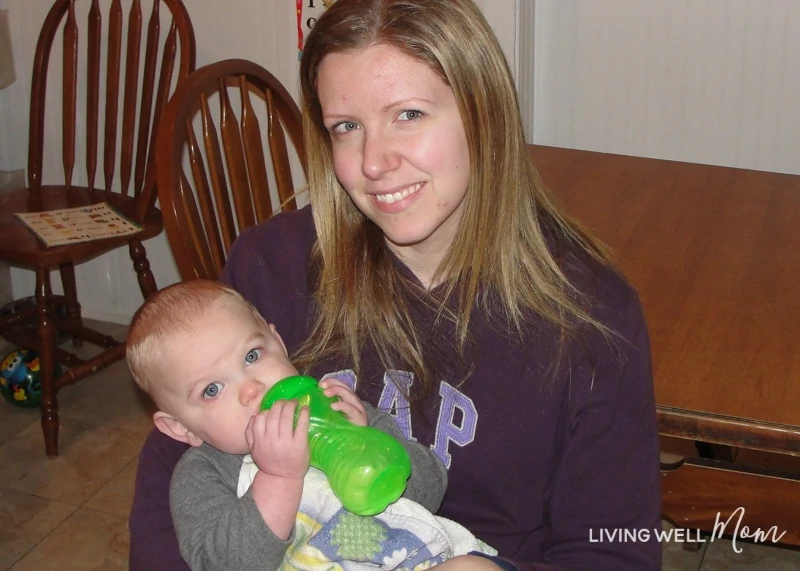

I was exhausted all the time.
But when my youngest turned 2 years old and was sleeping well and I wasn’t feeling any better, it was clear to me that this wasn’t just from being a mother. There was something else wrong with me.
- No matter how much rest I got at night (even 9 hours of sleep), it felt like torture to wake up each morning because I was so so tired.
- I had no energy to do anything more than the absolute necessity.
- Working out – even walking a simple mile – wore me out so much that I could barely do anything else the rest of the day.
- I was irritable and impatient with my family.
- My brain was so “fuzzy,” I had a hard time remembering things.
- I was easily stressed and anxious over little things to the point where I felt like I didn’t know how to deal with daily life. I loved my life, but why did it seem so impossible at times?
It turns out, I wasn’t crazy or lazy. My body was literally exhausted.
I finally took things into my own hands and began doing my own research, which wasn’t easy due to my “brain fog.” I discovered that I wasn’t the only one to go through this – thousands more have and many, many more are undiagnosed. This book – Feeling Fat, Fuzzy, or Frazzled – helped me get on the right track.
Lab work confirmed that I did have low thyroid function (you can read more about that here), hormonal imbalances (too much estrogen and too little progesterone), and adrenal fatigue.
In the meantime, I continued my research and once I received my results, I began implementing some of the basic tips for what to do when you have adrenal fatigue. (More on that below.) I also took my results to my family doctor (a DO – doctor of osteopathy, so she was open to more natural, alternative options) and she gave me advice for treatment.
The good news is that my adrenal fatigue completely healed!
Now, I know I am prone to adrenal fatigue, so I take care to listen to my body and am watchful for any returning symptoms. I do occasionally have some of the signs pop up again, especially if I’m not getting enough sleep or eating well, but as long as I go back to more vigilantly caring for my body, I am just fine.
How to Diagnose Adrenal Fatigue:
If the symptoms and information here sounds familiar and makes sense to you, you might be wondering how to find out if you do have adrenal fatigue.
Unfortunately, many doctors don’t recognize “adrenal fatigue syndrome.” It’s not easy to diagnose with regular blood tests, which normally only detect severe issues such as Addison’s Disease or Cushing’s disease. Most people who have regular run-of-the-mill adrenal fatigue come back with ‘normal’ results when their adrenals are NOT functioning normally.
The most accurate way (that I’m aware of at this time) is saliva cortisol testing that takes 4 samples over the course of a 24-hour period.
Cortisol levels vary throughout the day and there’s a “range” of normal. For many people, their cortisol levels may be normal for part of the day, but not at other times. This is where it’s ideal to get 4 samples throughout the day instead of just one.
Here is the chart of my cortisol test results. The black dots are the 4 cortisol tests. The first is normal, the second is low, the third is normal, and the fourth is low.
How to Treat Adrenal Fatigue:
I healed my adrenals by following six concepts:
1) Get plenty of sleep.
Getting enough rest is essential. I make sure to get at least 8 hours of sleep (preferably even 9 hours) every night and also to be in bed by 11 pm, but no later than midnight. This is what my body needs to stay well.
You might not need as much as I do, but the most important thing you can do is listen to your body.
I know it’s tough, especially when you’re a busy mother, but if you prioritize your sleep, this is the one best ways you can help your body, whether you’re officially “diagnosed” with adrenal fatigue or not.
2) Reduce and cut out caffeine.
Did you know that caffeine actually stimulates the adrenal glands, which can exhaust them even more? I know it’s not easy to think about, especially when you can barely function as it is with caffeine, much less without, but reducing and removing caffeine from your lifestyle will likely make a huge difference.
I recommend gradually cutting out caffeine. It can be almost impossible to stop drinking coffee cold-turkey, so try’ it gradually. Instead of 4 cups today, try 3 and go from there. Or replace that 4th cup with decaf.
I gradually cut out all caffeine, aside from a cup of black tea every morning, and began to feel much better. Even now, I only drink one small cup of coffee every morning. If I drink more, I just don’t feel that well. I take that as my adrenals reminding me to be careful.
3) Stay hydrated
It’s always good to stay hydrated, but if you have adrenal fatigue symptoms, it’s even more important. Try adding a pinch of salt or squeeze of lemon juice to your water as a way to help replenish electrolytes (something adrenal fatigue sufferers tend to be deficient in).
4) Reduce stress
There may be small (or big) things you can do to help yourself reduce stress.
For me, I worked from home and reduced my workload during stressful times. Even now, if I have a tough week with my autistic son, I will deliberately cut back on other commitments so I can make sure to take care of myself.
This could be as simple as refusing to watch the news because you know it adds anxiety to your day.
5) Eat a nourishing healthy diet.
I struggled with this one for a long time because I’ve always had a sweet tooth and didn’t want to give it up. But as I gradually reduced my sugar consumption and began making better eating choices (I also went gluten-free and even Paleo for a time), I noticed a huge difference in my energy levels.
The best way you can help yourself in this area is to listen to your body. You don’t have to go gluten-free, but if you notice you feel poorly every time you eat a sandwich or piece of cake, you may want to eat less and see if that helps.
6) Be kind to yourself
Be gentle with yourself. You’re going through a lot and that’s why you’re here. Don’t make things even harder by holding yourself to impossible standards of perfection.
Don’t overdo it. If you are too tired to exercise, don’t force yourself. Or try something very gentle like beginner’s yoga. This is one of my favorite yoga DVDs.
7) Supplements
Be careful with taking supplements as you should talk with your doctor about which ones and doses before you get started. Taking supplements you don’t need can be harmful too.
I took supplements to support my adrenals after I received the test results confirming I had low cortisol levels, and that included Adrenal Cortex and herbs like ashwagandha. I still take these somewhat regularly. (I now do energy-testing to determine what my body needs on a daily basis.)
I also love this Adrenal Support herbal tincture, which includes ashwagandha and other thyroid-supporting herbs and flower essences from Herbal Energetics. You can take it in a glass of water or straight by mouth as a way to naturally help support your adrenals.
Recovering from Adrenal Fatigue
The good news is it’s entirely possible to recover from adrenal fatigue; it doesn’t have to be an exhausting life-long issue. But you can’t ignore your body or you’ll feel worse until your body forces you to do something.
Recovery will likely happen gradually, just like your adrenal fatigue symptoms came on. You will need to pay attention to your body. But it is absolutely possible and well worth it when you begin to feel like yourself again!
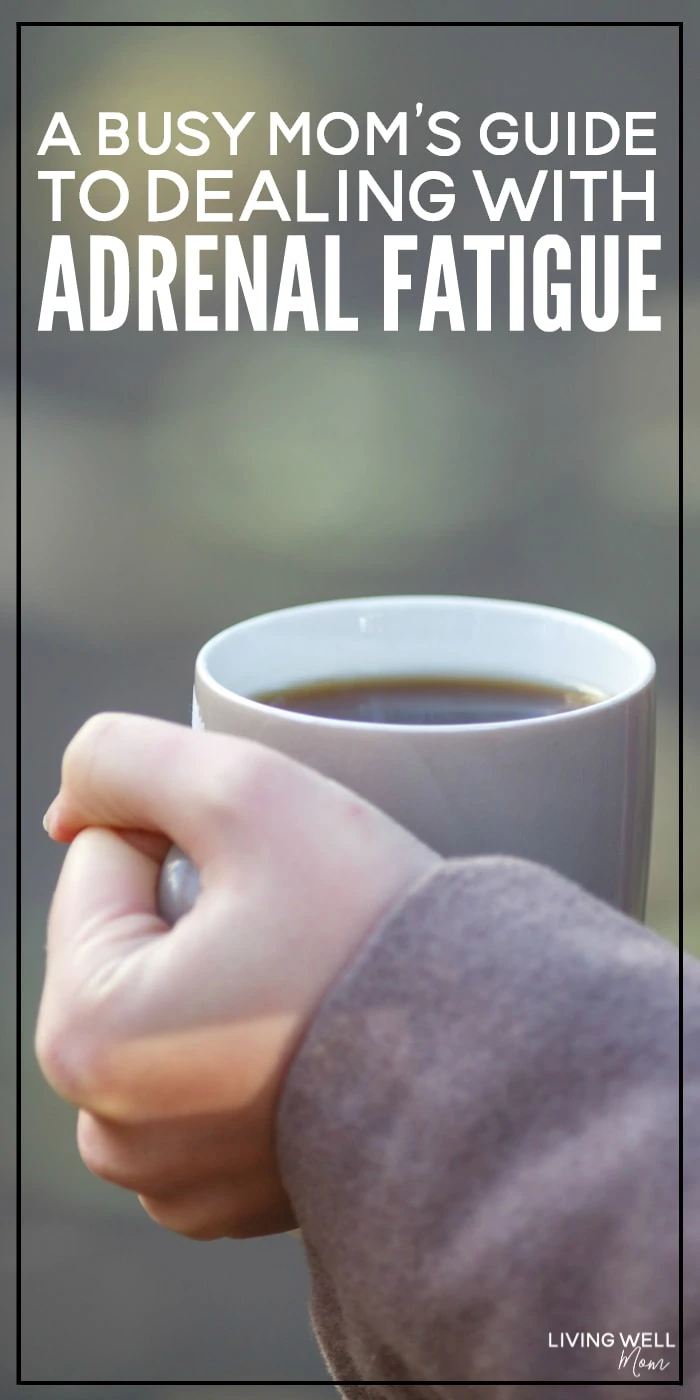
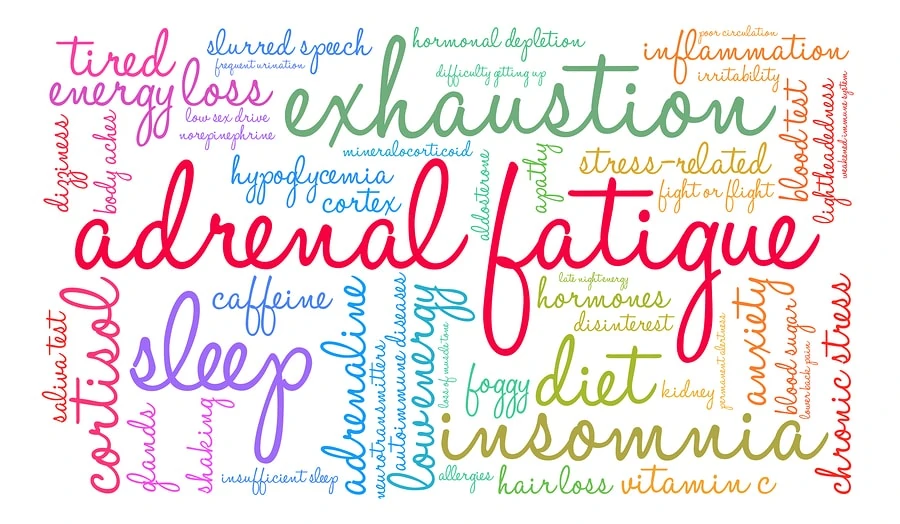
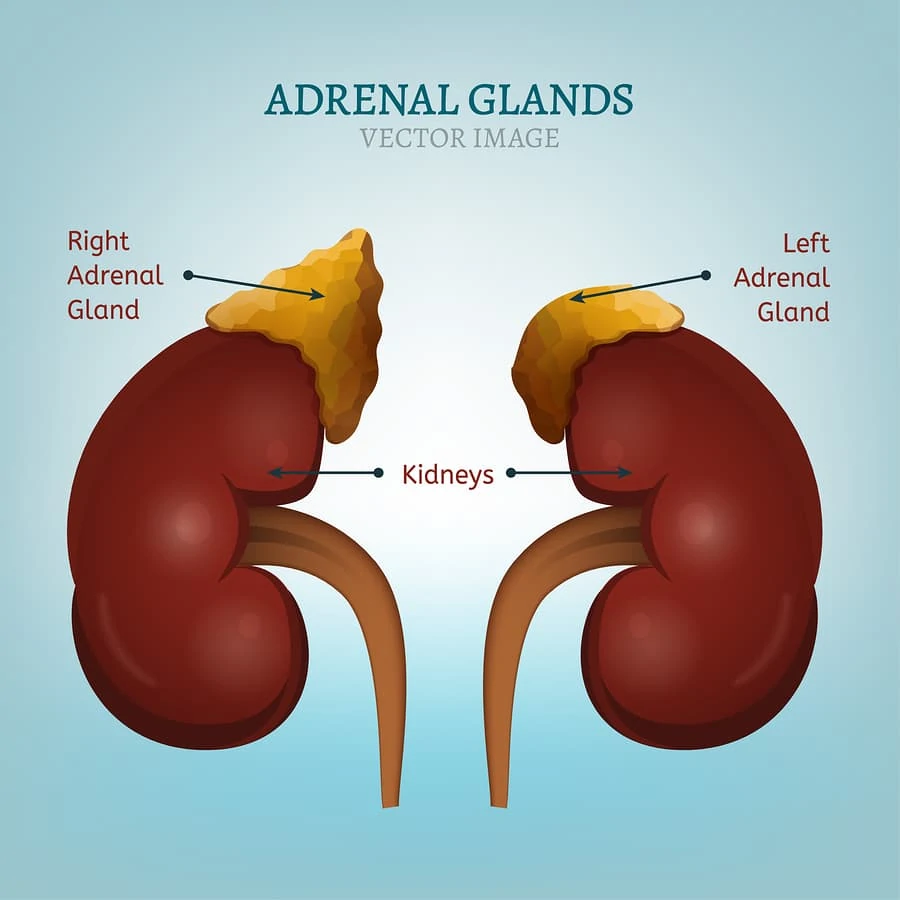

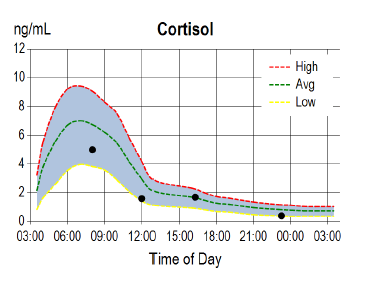




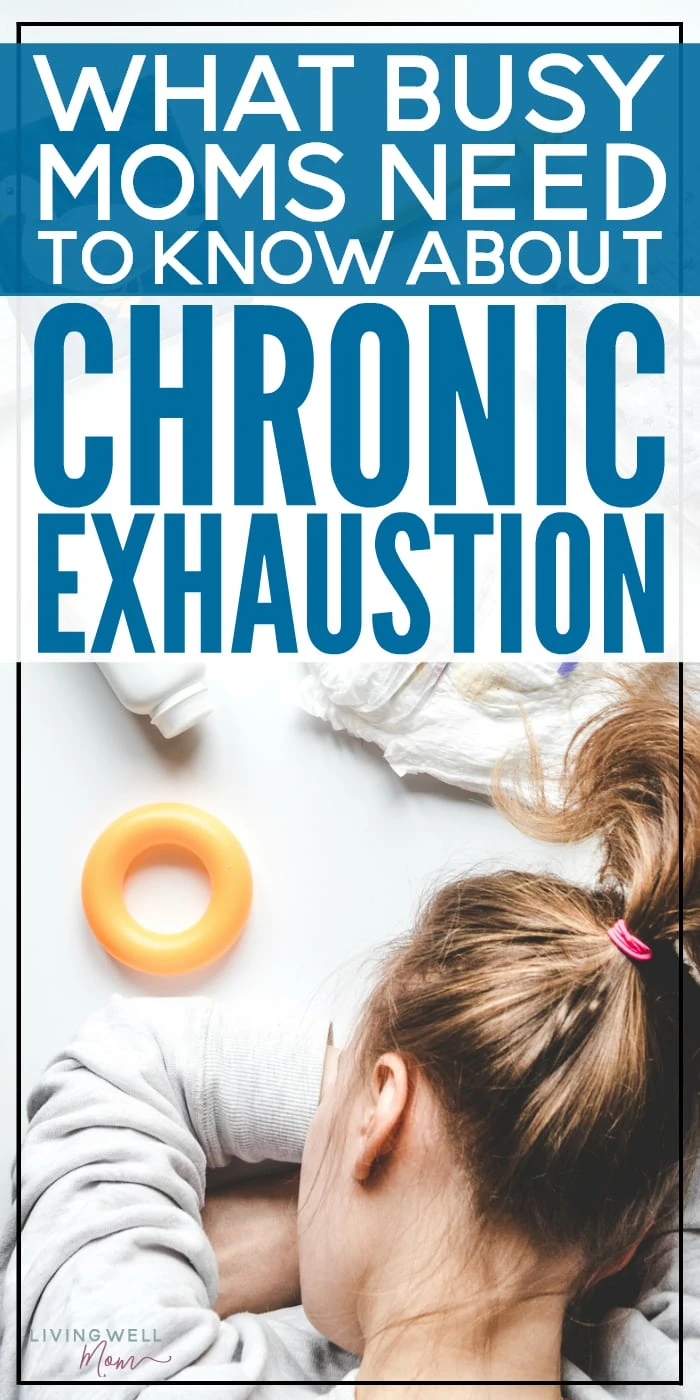
Tarina says
love to read your post. Inspiring me ☺
Dawn says
Can adrenal fatigue be reversed by just diet?
Erika says
Hi Dawn, I’m sure it can for some people – diet is so important. Of course, adequate rest is absolutely essential too.
Diane says
Reading your blog is like a breath of fresh air today. I’m at a cross roads with huge life stressors (including the decision of whether or not to keep homeschooling) and KNOW that I have adrenal fatigue syndrome. I just called my dr to order the saliva test and blood work. Thank you for the kick in the tail I needed to claim back my life!
Lauren Atk says
Thank you for sharing your story. I have been dealing with this since my second was born almost two years ago. My recent Cortisol test looks almost identical to yours. How sick did you feel? I feel pretty darn sick 🙁
Erika says
I felt pretty bad, Lauren. There was one point where my heart was racing and I’d almost pass out every time I would stand up. It’s an awful feeling.
But I feel amazing now so there is hope! Big hugs! Praying for you.
Jann Simpson says
Hi
I clicked on the https://www.canaryclub.org/ Link and I’m having a hard time finding the saliva cortisol test specifically. Is it the same as a Saliva Hormone test? If so, is it basic or Advanced?
Or is it the Cortisol 4x stress profile?
Thanks for your help!
Erika says
Hi Jann, I believe this is the right test – https://canaryclub.org/home-diagnostic-tests/focused-test-profiles/focused-tests/cortisol-4x-stress-profile
Jenna Zamitalo says
Thanks for sharing your story! How I can relate. How long did your recovery journal take? I’m about a year and a half into mine and still have a ways to go. Not to mention I’ve had been pregnant and/or nursing continually over the past five years.
Erika says
It took me a good 2-3 years. Even now, I am still prone to adrenal fatigue if I’m really stressed (ie 2020 haha). But now I know how to help myself – I go back to the basics and take extra supplements. Vitamin C is particularly helpful for me. (I take 2,000 IUI morning and night.) Right now, I’m doing really well.
Good luck! Feel free to email me anytime – erika@livingwellmom.com